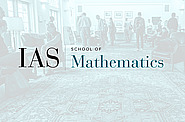2011-2012 Seminars
Mar
19
2012
Computer Science/Discrete Mathematics Seminar I
Optimal Estimators for Entropy, Support Size, and Related Properties
Gregory Valiant
11:15am|S-101
Mar
13
2012
Computer Science/Discrete Mathematics Seminar II
Applications of FT-Mollification II
10:30am|West Bldg. Lecture Hall
Mar
12
2012
Computer Science/Discrete Mathematics Seminar I
Computational Aspects in the Braid Group and Applications to Cryptography
11:15am|West Bldg. Lecture Hall
Mar
06
2012
Mar
05
2012
Feb
28
2012
Computer Science/Discrete Mathematics Seminar II
Complexity, Approximability, and Mechanism Design
Christos Papadimitriou
10:30am|S-101
Feb
27
2012
Computer Science/Discrete Mathematics Seminar I
An Additive Combinatorics Approach to the Log-Rank Conjecture in Communication Complexity
Noga Zewi
11:15am|S-101
Feb
23
2012
Feb
23
2012
Special Computer Science/Discrete Mathematics Lecture
Zero Knowledge Proofs and Nuclear Disarmament
1:30pm|S-101
Feb
21
2012
Computer Science/Discrete Mathematics Seminar II
Finding Needles in Exponential Haystacks
10:30am|S-101
